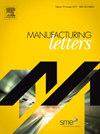Friction-stir, tailor-welded blanks made from primary and recycled 6082 aluminium alloys
IF 2
Q3 ENGINEERING, MANUFACTURING
引用次数: 0
Abstract
The use of aluminum is increasing in electric vehicles (EVs) owing to the high demand for weight reduction. Producing aluminum from recycled scrap requires 95 % less energy than primary metal production, which provides the potential to accelerate the transition to a carbon–neutral economy. In this research, we use Tailor-Welded Recycled Aluminum (TWRA) made of recycled and primary aluminum, aiming to understand the weldability with recycled materials and their potential use as automotive components. AA6082 produced by extrusion from primary and recycled materials, respectively, were welded by conventional Friction Stir Welding (FSW). The welding process was performed both in T4 and T6 temper conditions. Despite the undermatched characteristics relative to the base metal, the primary–recycled joints showed higher joint strength when welded in T4 condition and higher ductility when welded in T6 condition. SEM and EDS analysis revealed precipitate evolution, and intermetallic phases played a strong role in determining the mechanical behavior of these welded joints.
摩擦搅拌,定制焊接坯料由原铝和回收6082铝合金制成
由于对减轻重量的高要求,铝在电动汽车(ev)中的使用正在增加。从回收废料中生产铝所需的能源比生产原金属少95%,这为加速向碳中和经济过渡提供了潜力。在这项研究中,我们使用了由再生铝和原铝制成的定制焊接再生铝(TWRA),旨在了解再生材料的可焊性及其作为汽车零部件的潜在用途。采用常规搅拌摩擦焊(FSW)对原材料和回收材料分别挤压生产的AA6082进行焊接。焊接过程在T4和T6两种回火条件下进行。尽管与母材不匹配,但在T4条件下焊接时,原生再生接头的接头强度更高,在T6条件下焊接时,接头的延展性更高。SEM和EDS分析显示析出相的析出,金属间相对焊接接头的力学行为起重要作用。
本文章由计算机程序翻译,如有差异,请以英文原文为准。
求助全文
约1分钟内获得全文
求助全文
来源期刊

Manufacturing Letters
Engineering-Industrial and Manufacturing Engineering
CiteScore
4.20
自引率
5.10%
发文量
192
审稿时长
60 days
 求助内容:
求助内容: 应助结果提醒方式:
应助结果提醒方式:


